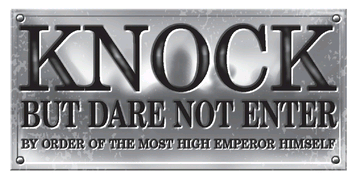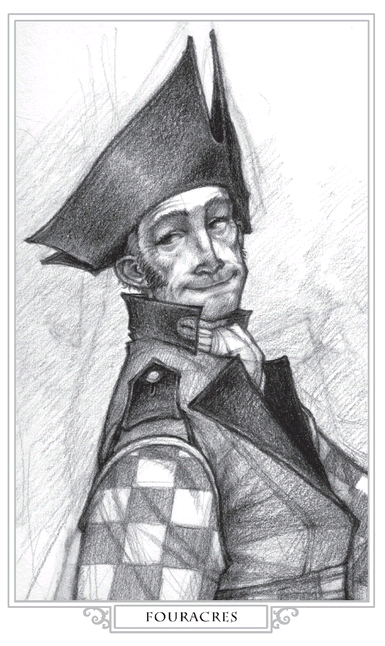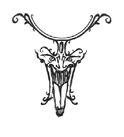Foundling (24 page)
Authors: D. M. Cornish
“Just go to the coachman’s cottage of the Imperial Postal Office,” offered Mister Billetus. “’Tis where all the drivers spend their time waiting their turn to drive the mail from town to town.”
As it was deemed too late in the day for him to proceed, Rossamünd was forced to wait till the next day to seek a driver in Silvernook. Instead he went to the common room to have dinner. Just as the night before, a maid served him and he chose a meal from a list upon a large oblong of card she held.
At the top it read “Bill of Fare” . . . and beneath the dishes were categorized under subheadings: “Best Cuts” and “The Rakes.” The difference Rossamünd could not fathom. Last night he had chosen lamprey pie from the list headed “The Rakes” because he had had it once before and did not recognize the names of any of the other meals. It did not taste very good. Tonight he picked the venison ragout, and also asked for an exotic-sounding drink listed as “Juice-of-Orange.” When this beverage arrived, it had a flavor that, yet again, amazed the simple tastes of the foundling. Sharp, sweet, tangy, refreshing, the juice was like the best orange he had ever eaten. The venison ragout, on the other hand, he found a bizarre flavor in his mouth, making it tingle and smart, but he pushed it down all the same. Not even the fussiest book child ever left food on a plate.
A woman dressed in an astounding display of peacock feathers and blued fur stood at the other end of the common room and sang so sweetly Rossamünd forgot to eat for minutes at a time. Apparently her name was Hero of Clunes—so he heard people about him say—a famous actress from faraway south. Rossamünd wondered what she might be doing in this remote region. Looking for “Clunes” in his almanac, Rossamünd found to his amazement that it was so far south it did not even show on any of his charts.
He finished his meal and returned to his room to slumber. Europe still lay in bed, her back to the door. Rossamünd could not tell whether she slept or simply ignored him, and cared little for the risk to find out which.
Not long after dawn he set out. Master Billetus sent Little Dog with him to show the way. Little Dog went forth barefoot, protected by proofing of much lesser quality than Rossamünd’s own fine jackcoat. He proved shy at first and seemed in awe of the foundling, an attitude so new to Rossamünd that he found it unnerving.
They were let through the gates, which were firmly shut again behind them, and quickly arrived at the intersection by which the Harefoot Dig was built. A sign was there telling them that they had arrived at the Gainway. To the south, it said, was High Vesting. To the north was Silvernook, and below this Winstermill. The back of Rossamünd’s head tingled as he realized how close he was to his final destination. He had just to keep going north past Silvernook and he would arrive there. If it was not for Mister Germanicus waiting for him in High Vesting, he just might have. They turned left and went north up the Gainway toward Silvernook.
Little Dog walked quickly and Rossamünd strained to keep pace. It was hard work and left little breath for conversation. The page boy kept looking about nervously, and Rossamünd joined him. Overloud rustles made them jump and hurry on. Once a loud crack away among the trunks alarmed them so much they fled the road and hid behind a knuckle of lichen-covered rocks. It was always a relief whenever a cart or a carriage passed them by, the drivers typically offering a wave and sometimes a friendly, incoherent greeting. This traffic became more and more frequent as the day progressed.
By about the first bell of the forenoon watch—as Rossamünd reckoned it—a cart rattled by and stopped. Its rubicund driver
hoi
ed! them cheerily, calling, “Little Dog! Ye’re wanting a hitch to Silvernook?” to which the two tired walkers gave a hearty
yes
.
hoi
ed! them cheerily, calling, “Little Dog! Ye’re wanting a hitch to Silvernook?” to which the two tired walkers gave a hearty
yes
.
The driver introduced himself to Rossamünd as Farmer Rabbitt and chatted merrily about “taters” and “gorms” and how Goodwife Rabbitt was heavy with child. “Moi first, yer know,” he grinned with a wink. Rossamünd thought him the happiest fellow he had ever met, and could not help but grin along with the farmer’s ready joy.
The darkling forest gave way to great, high hedges of cedar trees, grown close and thick along the verges. In the midst of almost every hedge-wall there was some kind of grand and solid-looking gate. Little Dog informed him that these were the fences behind which lived the local gentry.
As they rattled on, Rossamünd thought on the perplexing choice before him: stay true to the original path—become a lamplighter and take on a boring life, or become the factotum—the servant—of a woman who did deeds with which he could never agree? It was more than he knew how to solve, and he hoped circumstances would provide a solution for him.
Soon enough they arrived at Silvernook, hidden within a high bluestone wall. The gates of the town were open, but they were watched. The town’s gaters, who wore the black uniform of Brandenbrass, eyed them sternly as Farmer Rabbitt drove through. He set Little Dog and Rossamünd down by the Imperial Postal Office, where the lads parted ways, for Little Dog had an errand to run somewhere else in the town.
“I’m sorry, Mister Rossamünd, sir,” he said, “but I probably won’t be able to show you back to the Dig.You’ll find yer way back a’right, though, won’t you?”
“I reckon so, Little Dog,” answered Rossamünd, blushing at the boy’s deference. “I’ll have my driver by then—he’ll be going back with me, I’m sure.”
With a satisfied nod, Little Dog left.
The Imperial Postal Office of Silvernook was narrow and high, like every other building in the town, making the most of the limited room offered within the safety of the town’s walls. And as always, its chimneys were extraordinarily tall. As far as he knew, chimneys were so lofty because it was reckoned that the higher they were, the harder it would be for some curious bogle to climb them and do mischief.
People were going into and coming out of the Imperial Postal Office steadily. Rossamünd found that he had to join a queue of high-class ladies in their voluminous skirts and festooned bonnets; guildsmen in their weathered leather aprons; and middle-class gentlemen buckled inside high collars and flaring frock coats, just so he might ask for further help. When he finally arrived at the serious woman on the other side of a perforated wall, she informed him that the coachman’s cottage was beyond a certain side door, through which he proceeded directly.
The door opened onto a long drive that went between the Imperial Postal Office and another equally tall building. This drive took him to a sizable open area at the back, large enough to turn a two-horse carriage about, surrounded on every side by high houses. In a far corner was a small dwelling with a bright red door: the coachman’s cottage. A brass plaque screwed to it declared:


. . . and Rossamünd did just that.
There was a long pause.
He tried again, and the portal was finally opened, a thin, grudging gap.
“Hello,” Rossamünd began, hands clasped meekly. “Do you have any drivers in there?”
The gap increased slightly.
“You what?” came a sour voice from within.
Rossamünd cleared his throat nervously. “I . . . uh, we are needing to hire someone to drive the landaulet down to High Vesting. Um, we’re at the Harefoot Dig, you see, and . . .”
“You want someone to go with you down to the Dig,” the sour voice demanded, “so they can drive some cart to High Vesting, aye?”
“Ah . . . aye.”
“And how much you got in your purse?”
“I . . . um . . .” Flustered, Rossamünd counted his coins. “One sequin, a florin and eight guise.”
“I seeeee.” The sour voice sounded less than convinced. “Wait there.”
The door closed with a bang.
Fidgeting, Rossamünd was made to wait what felt like an overlong time.
Finally the scarlet door was pulled open a crack once more. “Sorry, no drivers available,” the sour voice declared, sounding almost triumphant. “Too busy! Try the Drained Mouse on Fossick’s Cauld—plenty of desperate lads there. Good-bye.”
“But wait, I don’t . . .”
The door closed with an even louder, all-questions-ending bang.
Even before Rossamünd had a chance to turn and walk away in disgust, the door was opened once again, wide this time. “So yer need some help with a driver, do yer?” a voice inquired.
Before him stood a cheerful-looking man with a ready, toothy smile and large ears that stuck out prominently, made more obvious by his hair, which was unfashionably short like Rossamünd’s. This fellow was dressed in drab, sturdy proofing: a jackcoat strapped all the way down the front; longshanks of a thick, corded material; and white gaiters reaching as high as the knee fastened over sturdy dark brown road-shoes. Wound tightly about his waist was a broad sash, and fixed by black ribbons to both arms were broad oversleeves of a brightly colored taffeta of rouge and cadmium checkers.

Rossamünd instantly recognized the mottle of a postman, those faithful fellows who braved bandits and bogles and foul weather to deliver mail to and from the scattered folk of the country. The colorful cloth was set off nicely against his otherwise dull attire, and made the man look important and serious, quite at odds with his friendly expression. In his hand he held a black tricorn.
Rossamünd frowned at him, not knowing how to answer.
“Hello, lad, sorry about being so abrupt. Just had ter make sure I got t’ yer in time. My name is Fouracres.” The man reached out a hand for Rossamünd to shake.
The boy did just that, as Fransitart had taught him to, looking up at the man’s face seriously. “Hello, Mister Fouracres. I’m Rossamünd.You’re a postman, aren’t you?”
The fellow nodded smartly. “Yes, lad, that I am—bit obvious, ain’t it? Rossamünd, yer say? Well, Mister Rossamünd, those other slothful souses in there might not want to help, but I may be of service to yer.”
“How so, sir?”
“Well, I’m needed in High Vesting, yer see, and I couldn’t help hearing yer needed a driver to take yer ter High Vesting, so I think: two people, same problem, one solution. I’d like ter offer me services to yer as the driver yer need. I’m not as well practiced as these daily-driving gentlemen—I’m a walker, yer see—but I still know how to switch a rein.”
Rossamünd did not care what the man’s credentials were: he could drive, that was all he wanted to know. He accepted Fouracres’ offer with glee.
The postman bowed humbly. “Just wait by the front of the office, and I will join yer as soon as I’m able,” he offered with a grin.
With many an exuberant
thank you, sir!
Rossamünd went back through the Imperial Postal Office and waited on the street out in front. It took a long time for the postman to emerge. As Rossamünd waited, with people and vehicles bustling by, he began fretting that he had been duped by the unwilling people inside the coachman’s cottage. His fears proved unfounded, however, for Fouracres arrived soon enough, hat on head, bag full of dispatches on his back and a satchel over his shoulder—ready to leave. Before much longer they were walking back out the gates of Silvernook and returning down the road to the Harefoot Dig.
thank you, sir!
Rossamünd went back through the Imperial Postal Office and waited on the street out in front. It took a long time for the postman to emerge. As Rossamünd waited, with people and vehicles bustling by, he began fretting that he had been duped by the unwilling people inside the coachman’s cottage. His fears proved unfounded, however, for Fouracres arrived soon enough, hat on head, bag full of dispatches on his back and a satchel over his shoulder—ready to leave. Before much longer they were walking back out the gates of Silvernook and returning down the road to the Harefoot Dig.
Rossamünd had found a driver!
13

Other books
Carola Dunn by Christmas in the Country
Calli Be Gold by Michele Weber Hurwitz
Wicked Demons 2 by Reece Vita Asher
Sympathy for the Devil by Billy London
Ricky's Business by Ryan Field
The Kyriakis Curse by Eve Vaughn
Irresistible You by Connelly, Victoria
Murder in Nice by Kiernan-Lewis, Susan
The Calling by Alison Bruce
Progress (Progress #1) by Amalie Silver